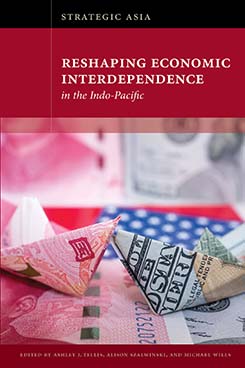Japan’s Approach to Economic Security and Regional Integration
This chapter from Strategic Asia: Reshaping Economic Interdependence in the Indo-Pacific examines the systematic efforts by the Japanese government to minimize security vulnerabilities from economic dependence on China and finds scarce evidence for broad decoupling.
EXECUTIVE SUMMARY
MAIN ARGUMENT
Japanese international business has two simultaneous trends: an increased diversification of trade and investment and a deepening reliance on China in key sectors. State policy reflects this bifurcation. The state-led liberal strategy promotes regional economic integration (including with China) while maintaining policies focused on supply chain resilience, critical technologies, and diversification away from China. There is no evidence suggesting that full-scale decoupling is currently occurring or likely to occur in the near future, but there is private-sector diversification in the region. Japanese business strongly supports globalization, and it is unlikely that the Japanese government will broadly implement policies that harshly restrict business opportunities with China. However, evidence indicates that industries under threat of economic coercion or severe disruption respond to government incentives and are actively diversifying. At the same time, Japan is engaged in international efforts to improve supply chain resilience. Japan is also participating in some multilateral export controls and sanctions regimes.
POLICY IMPLICATIONS
- Japan is eager to engage in multilateral initiatives to improve supply chain resilience. The U.S. should include Japan in relevant policies to benefit from Japanese expertise and technical skill in critical technologies.
- Japan has a track record of diversification in critical minerals and their downstream products and continues to pursue more opportunities. Multilateral cooperation in these industries should be welcomed.
- Broad demands to decouple or de-risk from China will not be treated seriously by key Japanese business actors and could hinder cooperation on more targeted, though still costly, economic security measures.
Kristin Vekasi is an Associate Professor in the Department of Political Science and the School of Policy and International Affairs at the University of Maine.
Strategic Asia
The Strategic Asia annual edited volume incorporates assessments of economic, political, and military trends and focuses on the strategies that drive policy in the region. Learn more about Strategic Asia.



